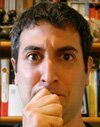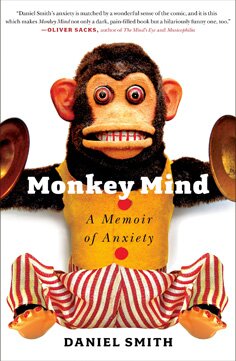I’ve got a new piece in The New York Times about anxiety. This one is about anxiety and habit; I argue that while anxiety might come on as an affliction/disorder, it continues because it is a habit of mind. Whatever else might help us feel better, recovery demands that we find some way to alter the damaging, insalubrious patterns of thought into which anxiety leads us. (“Lead” might actually be the wrong verb; it seizes us by the lapels and yell into our ears.)
The essay, titled “The Anxious Idiot,” is part of the Times’s great Anxiety series. It’s the third I’ve done for the series. The first essay, published in January, was called “It’s Still the ‘Age of Anxiety.’ Or Is It?” The second essay, published in May, was called “Do the Jews Own Anxiety?”







Greetings Daniel.
Thank you for the article in NYT. I found it interesting, especially how you wrote the Anxious mind fears laziness. Permit me to explain why.
I grew up in Missouri on a farm, my father was/is a respected surgeon but thought that a (guessing here) rural upbringing with strong focus on constant labor would embed my brother and I with a greater hatred for manual labor than anything else he could do. I don’t know if he’s right, even now, but I do so hate manual labor and make my living punching keys on a keyboard.
And I’m smart. Near genius level, I’m told.
And I also am an Idiot, and have suffered throughout my life, since about the age of 16, from recurring ‘seasonal disorder’ precipitated by anxiety, but before that a terribly disruptive difficulity with concentration and lack of my constant companion in life, hyper-focus.
I struggled for years with these various afflictions, taking psychotrops and going to, and through, therapy. And In the end, I quit going (ok, my wonderfully intelligent Therapist retired) and quit taking the variety of meds that never really had a noticiable affect.
All of this was because I had been given a new diagnosis, and a new medication, and can honestly say it changed my life and I’m a better person because of it. I was diagnosed ADHD, and perscribed the standard amphetimne salts. And it works…has for 1.5 years now (where before I’d not be able to go 2 months without an ‘episode’).
Well, just wanted to share. It’s a bitch of an affliction, but every one of us is a setting sun, you know?
Cheers
-wc
Loved the Anxious Idiot. I look forward to reading your book; it’s now #229 on my list of must reads. The train tracks metaphor is spot on and comparing the anxiety sufferer to an alcoholic really clarifies. I’ve been struggling with this sh*t as long as I can remember: self pity, self loathing, and worse. I think I’m turning a corner here. Thanks for the clarity and validation.
#229! How do I move up THAT list??
You state that anxiety starts as an affliction/disorder, but persists as a “habit of mind”. And in your NYTimes article you cite “anxious thoughts”.
First of all, anxiety is something that everyone experiences, but extreme anxiety that disrupts one’s life is indeed a disorder (or rather a set of disorders, depending on the what characteristics of the anxiety are). In some cases, negative thoughts are the source for anxious feeling, or at least are well correlated with them. But not in all cases.
Second, grow up!
Stop it!
You should listen to Paul Gillmartin’s podcast The Mental Illness Happy Hour. It’s right up your ally and you’d be a good guest on it.
Thanks, Mary. I love The Mental Illness Happy Hour. Would love to be a guest. You should write to Gilmartin and suggest it!
The 10th (proper) paragraph made me almost burst into tears at work…
I guess i need to read your book!
Why cognitive therapists love “anxious idiots”.
Thank you Daniel Smith for a seriously playful approach to your anxiety. You are, with a liberating sympathetic attitude to your suffering, giving an intelligent description of a mental pain that a growing number of people thinks of as incurable. The unfortunate consequence is that you, and a too-large portion of our fellow human beings, become the high-paying victims and livelihood of the cognitive psychotherapy and the pharmaceutical industry.
The fatal thing of being an “anxious idiot” is that the treatment providers, the cognitive therapists, are themselves “anxious idiots”, constantly on the run from any hint and confrontation that would remind them of their anxiety. The cognitive approach is, despite an apparent verbal flexibility, basically stereotype and seeks to eliminate the thoughts that lead to your anxiety and repression, and they hope to create “a positive substitute”. What they really are trying to do, literally and figuratively, is intellectually to convince both, themselves and you to reason away the pain behind your anxiety and repress it further. Which basically means, for a brief time, then the pain / anxiety shows up on the point, in mind and body, where you are currently weakest. Just as you say: “I have been experiencing this pattern for nearly 20 years now, so that my anxiety has come to seem, at times, ineviteble and unassailable – a fait accompli. My anxiety, I’d conclude, is what I am. There is no escape”.
Is there really no escape? After 40 years of searching and testing, I have learned that it is a tedious but far from impossible task. The kind of “perpetual mobile” that you have drawn up in your nice, close to emotional, description, of how the anxiety returns, can be broken if you learn to understand what it is about your emotional and intellectual processes that make you a prisoner in your own pain / anxiety. You can eventually learn to understand what it is that makes it necessary for you to seek help from professional cognitive therapists who themselves, unconsciously, suffer from the same repression / pain / anxiety, which in your case means that the pain is leaking anxiety with an almost predictable regularity.
To treat a patient successfully it is imperative to take into account his/her psychological history that might contain abandonment, neglect, and experiences close to death. Most importantly, a skilled therapist must consider an individual’s early physical and psychological development, and examine that critical period from gestation through the first three years of life, which science is just now beginning to recognize has so much to do with problems later in life. It is necessary to look at the person as a whole and consider the patient’s early history, taking into account physiological as well as psychological factors.
To quote my friend Dr. Art Janov:
“Symptoms are the expression of imprinted memory /memories of experiences we had in our earliest moments that have been laid down neurochemically within our brain and nervous system. That is what lies in the primal universe—monumental emotions of imprinted memories that have been sequestered in the far reaches of the brain. For a patient to get well, it is necessary to access those memories in a safe way, bring them to conscious-awareness and finally to integrate them. When that happens the individual’s entire system is harmonized, key hormones are normalized, and the system is finally righted. After a connection is made between feeling-sensations and the thinking mind, perceptions are more accurate and a sense of calm and relaxation never before known is finally experienced.”
Yes, there is an escape!
Jan Johnsson
http://epilepticjourney.blogspot.com.es/2012/07/why-do-i-mistrust-intuition-by.html
Loved your article, specifically the lightness of tone, and the obvious empathy & compassion. I have struggled with crushing anxiety and depression for almost exactly two decades. Finding this article as I’ve been attempting to extricate myself from the worst episode in several years has been a real gift. Deep gratitude from a fellow traveler.
I was moved to tears watching the Today Show segment featuring your story. Maybe for a different reason than you might think. Like your wife, I have been the witness, the supportive partner. I have felt so alone and exhausted supporting my partner (of over a decade) who has struggled with extreme anxiety. I was dumb-struck by the similarities in your story…from the on-again, off-again beginning to our relationship, to the social anxiety and waking up in the middle of the night rehashing every moment, every word, witnessing the love the shame, AND listening—so much listening…my spirit is almost broken from the yo-yo of living so closely to the epi-center of so much anxiety. I’m exhausted. Does your wife have a blog? Seeking any advice for the partner of someone with extreme anxiety. And so grateful you shared your story. It sparked a great conversation for us and gave me hope.
Read your article in NYT on anxiety & habit, and went to you website. Thanks for letting us share in your recovery, I don’t feel so alone. Keep your chin up & be well!
Dan — thank you. I recently read (and shared on Facebook) your excellent essay. It resonated with me as I, too, suffer from sometimes crippling anxiety — even though I know what I can do to alleviate it. Thanks for articulating the experience so well and reminding me that I can get out of it (as impossible as it often seems).
I came across the article again tonight while Googling “journalist anxiety disorder” — yep, I’m in the field as well, and am wondering if it’s a terrible fit for a chronic worrier. I would love to hear your thoughts on this (forgive me if it’s already in your book, which I will read very soon, I promise).
Hi,
OMG! I just saw your interview on CBS this morning. I have never ever feel more identified with the words you just spoken, about how can something maybe so little for somebody can trigger all that chain of tragic thoughts in the mind of a person suffering from anxiety. I’m 31 years old now and I’ve been having panic attacks for about 10 years! I got to a point so bad in my life that I couldn’t eat because I thought I would choke with the food, I couldnt read the newspaper because I thought the ink would get trough my fingers and get me intoxicated. It was a really bad period in my life. I had to take antidepressant and anxiety meds. I’m doing better now but every once in a while when I’m under a lot of stress or hormonal changes I still get pretty bad panic attacks. I’m so definitely going to read your book. Thanks for sharing your history with the world and opening the eyes to this life changing disorder with a touch of humor :)
You looked v. composed during your CBS interview. Ironically, Gayle came across as comparatively amped — like your average bouncy Starbux gal operating in the higher frequencies. She really didn’t seem to get it; I wonder if Oprah would do better given her role as mental health diva. Oh well. That particular promotional ship has sailed. I found GK’s manner well-meaning as well as possibly inadvertently offensive. (Not to you, necessarily. To me!) Your decision to discuss a subject that is so personal and stigmatized in a morning talk show is kind of . . . surreal. Talk about “exposure.” Talk about double entendres.
Hi Dan,
I love your book and the way you approach teaching others about anxiety.
Keep up the great work!
Cheers,
Steve